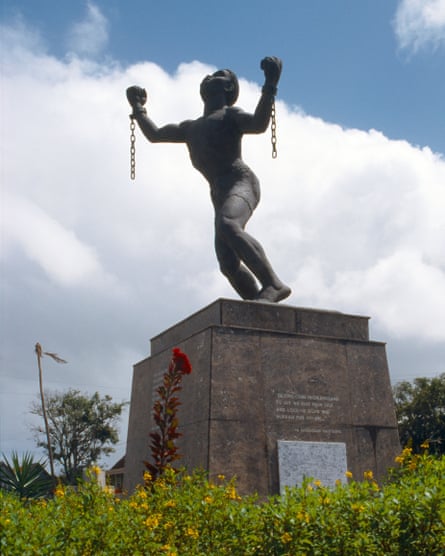The Conservative MP under fire for his ancestors’ role in Caribbean slavery is in line for a multimillion-pound payout from the Barbados government.
Despite threats to make Richard Drax pay reparations and seize his family’s plantation – described by one historian as a “killing field” of enslaved Africans – the government is now planning to pay market value for 21 hectares (about 15 football pitches) of his land for housing.
The move has angered many Barbadians, especially those who say the Drax family played a pivotal role in the development of slavery-based sugar production and the Barbados slave code in the 17th century. This denied Black Africans basic human rights, including the right to life.
Critics have called the planned deal an “atrocity” and said this is “one plantation that the government should not be paying a cent for”.
Trevor Prescod, MP and chair of the Barbados National Taskforce on Reparations, said: “What a bad example this is. Reparations and Drax Hall are now top of the global agenda. How do we explain this to the world?
“The government should not be entering into any [commercial] relationship with Richard Drax, especially as we are negotiating with him regarding reparations.”
In December 2020, the Observer revealed that Drax had taken control of the 250-hectare plantation on his father’s death in 2017 but he had not declared this in the UK MPs’ register of interests. He did then declare the plantation but said the registrar had told him he was not required to do so until probate was complete.
Drax is one of the wealthiest MPs and is worth at least £150m.

Historian Prof Sir Hilary Beckles has described Drax Hall as a “crime scene” where tens of thousands of Africans died in terrible conditions. The Draxes also owned a slave plantation in Jamaica, which they sold in the 18th century, and at least two ships that brought enslaved Africans to the Caribbean.
In 2022, the Observer reported that Drax, the MP for South Dorset, travelled to Barbados to meet prime minister Mia Mottley. It is understood he was asked to hand over all or a substantial part of Drax Hall plantation. If he refused, legal action would follow. Mottley’s spokesperson said the current Drax Hall purchase was not linked to reparations and the government “constantly acquires land through this process”.
Mottley has pledged to build 10,000 new homes to meet demand on the island, where there are 20,000 applications for housing. A senior valuation surveyor said the market value for agricultural land with an alternative use for housing would be about Bds$150,000 (£60,000) an acre. At this price, the 21 hectares could net Drax Bds$8m (£3.2m). The land would be for 500 low- and middle-income family homes, which would be for sale.
Barbados housing minister Dwight Sutherland, whose constituency in St George parish includes Drax Hall, said: “This is an acquisition process at market value. We compensate the landowners. It so happens that this land is owned by Mr Drax but this has nothing to do with reparations. It is a housing project.”
after newsletter promotion
He said that larger parcels of land in other parishes were also earmarked for housing. “This is to provide housing for the ordinary man and woman. St George people need houses as much as they need reparations.”
Barbados poet laureate Esther Phillips, who grew up next to Drax Hall, said the planned deal was an “atrocity” and a case of the victims’ descendants now compensating the descendant of the enslaver. “He should be giving us this land as reparations, not further enriching himself … at the expense of Barbadians. As Barbadians, we must speak out against this.”
Prescod added: “Slavery is a crime against humanity. This is one plantation that the government should not be paying a cent for. We are pursuing efforts for reparations for damages that were done by the enslaver. One of the greatest examples of this is Drax Hall, not just for Barbados, but the whole Caribbean region.
“Drax Hall is significant. An issue of this kind has to go to the House of Assembly. I’m not happy with the government going in this direction.”
Richard Drax declined to comment. In the past, he has said the role his ancestors played in the slave trade was “deeply, deeply regrettable but no one can be held responsible today for what happened many hundreds of years ago”.
Source: theguardian.com


